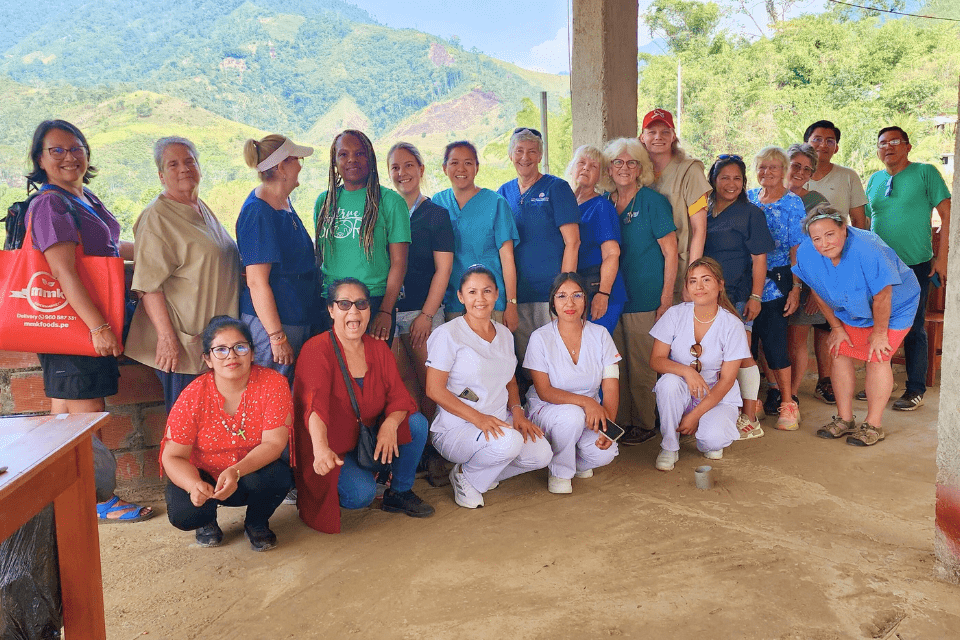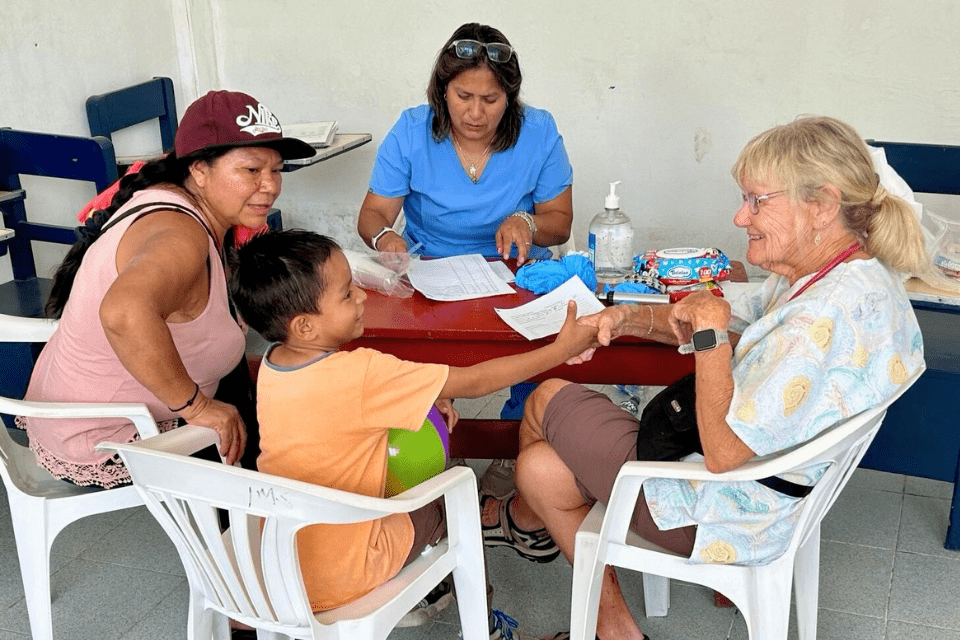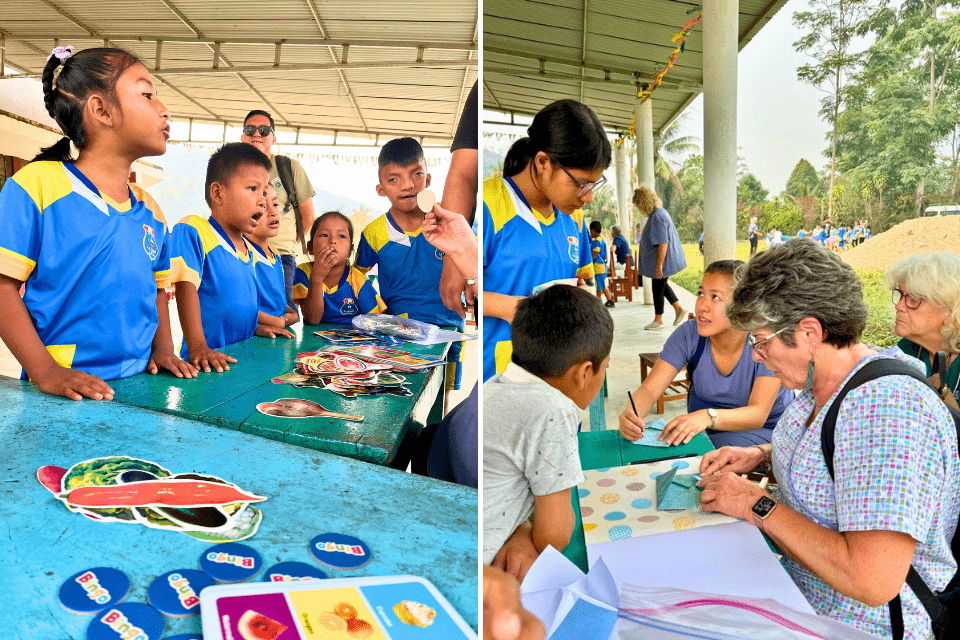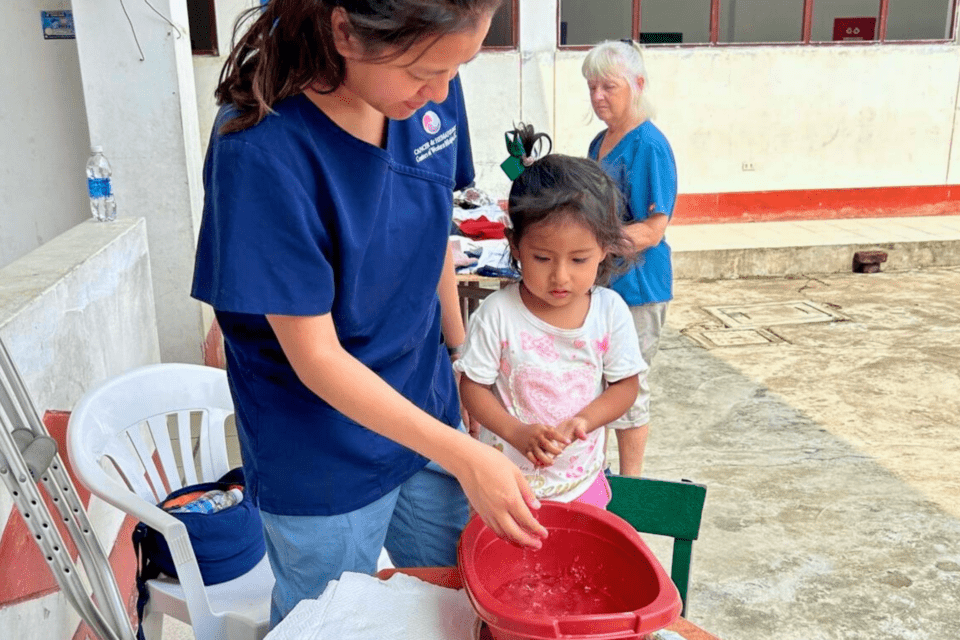In a role reversal, Heather Jue-Wong reflects on how she traveled to Peru as a health professional on a Volunteers in Mission journey and became the patient.
HEATHER JUE-WONG
Jackson: Trinity UMC
In early September, I embarked on a medical mission trip to Peru with a team organized by the Michigan and Wisconsin Conferences in partnership with the Methodist Church of Peru.
Our team comprised 14 people from the United States, mostly from annual conferences in the North Central Jurisdiction, and four interpreters from Lima and Satipo, Peru. Team members ranged in age from 19 to 79! We also served alongside a dozen dedicated volunteers from the Methodist Church of Satipo.
I feel blessed to have joined such a wonderful and diverse team to provide health care to people in Satipo and the surrounding areas. I am grateful for opportunities to build global connections within the Church, demonstrating God’s love and care and serving as the hands and feet of Christ.
For four days, we set up mobile clinics in communities in and near Satipo. These clinic days took place in school or church buildings or outside with tents and chairs we set up. Many days, people lined up waiting before we arrived at 9 am.
Our United Methodist Volunteers in Mission team included three nurse practitioners who saw patients and a registered nurse who ran the free pharmacy, each alongside our skilled interpreters. The rest of the team ran stations for children and adults while they waited, including a handwashing and toothbrushing table for health education and tables to distribute soap, toothbrushes, nail clippers, reading glasses and sunglasses, and bras. We also had tables with coloring and crafts for children and young people.

Each day, our team saw an average of 80 patients and didn’t leave until everyone waiting was seen; sometimes, that was at 2 or 4 pm or later. Since medical teams have visited in previous years, patients and community members recognized some of my teammates, expressed their deep appreciation for our service, and asked when we would return.
One of my favorite days was when we had health lessons and fun activities at an elementary school and an elderly care home and led a healthy lifestyle workshop at the church. The clinical team members took basic health metrics like height, weight, and blood pressure for the students and the older adult residents. At the school, we did activities like food and nutrition-themed bingo, reading bilingual picture books in Spanish and English, and folding origami cootie catchers. As one of the only American team members who spoke some Spanish, I found it funny and challenging trying to explain how to fold the paper and play with a cootie catcher in Spanish. It reminded me that I didn’t need to be a perfect, fully formed version of myself to be of service, and my presence and effort were gifts, too.
For the evening workshop at the church, I prepared a presentation in Spanish on non-communicable diseases (NCDs), as this was a topic requested by our Peruvian coordinator. NCDs are the leading cause of death and disability in the world and the leading cause of death in Peru. These diseases are chronic conditions that include cardiovascular diseases, chronic respiratory diseases, cancer, and diabetes, as opposed to infectious diseases that can be spread from person to person. Many NCDs are preventable, so it’s important to educate about healthy behaviors that can modify an individual’s risk for developing these diseases.
As someone who works in public health, I enjoyed presenting and engaging in conversations on these health topics. Other team members discussed healthy lifestyle habits, nutrition, sleep hygiene, mental health, and stress management techniques like yoga and meditation.

I had gone on mission trips before, mostly with my church’s youth group in high school. This was my first mission trip as a young adult, and it reminded me of how impactful and life-changing they can be as a volunteer participant. The early mission trips I went on as a high school student to North Dakota, Belize, Costa Rica, and Kenya influenced my decision to study public health and eventually work in global health. Traveling to these places, I saw disparities in access to health care and health standards in communities. I enjoyed building partnerships and relationships during these short-term service trips and reflected on how I could have a greater impact on matters of social justice.
During this recent trip to Peru, I saw how each of us was looking for ways to contribute and use our talents and gifts to help other people, whether we were young adults or recently retired adults. Team members came from different professional backgrounds, such as teachers, engineers, health professionals, musicians, and pastors. I realized that no matter what stage of life you are in, a mission experience deepens your faith and offers an opportunity to serve God and others.
One of the songs I remember singing in church growing up is based on Micah 6:8: “What does the Lord require of you? To seek justice, love kindness, and walk humbly with your God.” It acts as a refrain, reminding me why I love mission trips and choose to work in global health. I see health as a human right and believe everyone deserves a healthy life, including access to affordable and quality health care.
During our mission trip to Satipo, we provided health services to some people who may not have access to quality care. We showed God’s love and kindness as we washed each child’s hands one by one, gave people medications they needed, and shared smiles, laughter, and songs together. I was humbled and honored to be able to utilize the gifts God has given me to serve others. As I served and walked alongside others, I listened to and learned much from fellow sisters and brothers and how they lived out their lives and faith.

I also walked humbly, literally, on our first day in Satipo when I sprained my ankle while carrying boxes of medical supplies that had been shipped from Lima. I am immensely grateful for the love and care showered on me by the mission team and church members, including those who accompanied me to the emergency room, constantly brought me ice, and shared prayers for healing. I was on crutches for the rest of the week and helped with the coloring and handwashing stations as much as possible during clinic days.
Ironically, while I was on a medical mission trip to Peru to help provide health care to the people there, I became a patient needing medical and spiritual care, which my teammates and the community quickly offered. This reminded me that as much as we want to serve others during these mission journeys, we also gain fulfilling experiences and cherished memories, enriching our lives through our mutual service and the relationships we build.
Heather Jue-Wong attends Trinity UMC in Jackson, Michigan, and considers Ann Arbor: First UMC and Portage: Chapel Hill UMC as home churches that brought her up in faith. She is a public health professional working on programs and research to address health inequities in different communities and countries. She works for the World Health Organization and has previously worked on COVID-19 and the Ukrainian refugee crisis.
Want to learn more about Volunteers in Mission journeys like this one? Click here to visit their web page. Scholarships are available, so inquire by contacting Jody Pratt, the Michigan Conference’s VIM trainer, at prattgji09@gmail.com.
Last Updated on November 26, 2024

